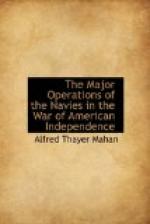At the end of 1776 began the series of British reverses which characterised the year 1777, making this the decisive period of the war, because of the effect thus produced upon general public opinion abroad; especially upon the governments of France and Spain. On the 20th of December, Howe, announcing to the Ministry that he had gone into winter-quarters, wrote: “The chain, I own, is rather too extensive, but I was induced to occupy Burlington to cover the county of Monmouth; and trusting to the loyalty of the inhabitants, and the strength of the corps placed in the advanced posts, I conclude the troops will be in perfect security.” Of this unwarranted security Washington took prompt advantage. On Christmas night a sudden descent, in a blinding snow-storm, upon a British outpost at Trenton, swept off a thousand prisoners; and although for the moment the American leader again retired behind the Delaware, it was but to resume the offensive four days later. Cornwallis, who was in New York on the point of sailing for England, hurried back to the front, but in vain. A series of quick and well-directed movements recovered the State of New Jersey; and by the 5th of January the American headquarters, and main body of the army, were established at Morristown in the Jersey hills, the left resting upon the Hudson, thus recovering touch with the strategic centre of interest. This menacing position of the Americans, upon the flank of the line of communications from New York to the Delaware, compelled Howe to contract abruptly the lines he had extended so lightly; and the campaign he was forced thus reluctantly to reopen closed under a gloom of retreat and disaster, which profoundly and justly impressed not only the generality of men but military critics as well. “Of all the great conquests which his Majesty’s troops had made in the Jersies,” writes Beatson, “Brunswick and Amboy were the only two places of any note which they retained; and however brilliant their successes had been in the beginning of the campaign, they reaped little advantage from them when the winter advanced, and the contiguity of so vigilant an enemy forced them to perform the severest duty.” With deliberate or unconscious humour he then immediately concludes the chronicle of the year with this announcement: “His Majesty was so well pleased with the abilities and activity which General Howe had displayed this campaign, that on the 25th of October he conferred upon him the Most Honourable Order of the Bath.”
[Footnote 15: At the present day reduced by reclaimed land.]
[Footnote 16: Beatson’s “Military and Naval Memoirs,” vi. 44, give 34,614 as the strength of Howe’s army. Clinton’s division is not included in this. vi. 45.]
[Footnote 17: Admiral James’s Journal, p. 30. (Navy Records Society.)]
CHAPTER III
THE DECISIVE PERIOD OF THE WAR. SURRENDER OF BURGOYNE AND CAPTURE OF PHILADELPHIA BY HOWE. THE NAVAL PART IN EACH OPERATION




